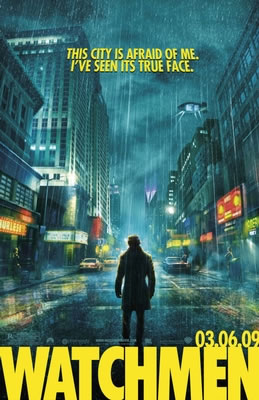 At the end of Watchmen, those age-old foes the United States and the USSR finally manage to put aside their differences. And, in one of those funny old cases of life imitating art, so two other sworn enemies have buried the hatchet and united as one; both the hardcore comic book aficionados and the film critics are unanimous in their verdict – Watchmen is awful. And, honestly, it is. Okay, so there are those critics that argue that it isn't just awful, it's also twaddle, and those comic book fans who will disagree with them and point to its divergence from the sainted source material as its sole weakness, and those other comic book fans who will stand by Watchmen and anything else from the oeuvre of Zack Snyder and proclaim it a masterpiece.
At the end of Watchmen, those age-old foes the United States and the USSR finally manage to put aside their differences. And, in one of those funny old cases of life imitating art, so two other sworn enemies have buried the hatchet and united as one; both the hardcore comic book aficionados and the film critics are unanimous in their verdict – Watchmen is awful. And, honestly, it is. Okay, so there are those critics that argue that it isn't just awful, it's also twaddle, and those comic book fans who will disagree with them and point to its divergence from the sainted source material as its sole weakness, and those other comic book fans who will stand by Watchmen and anything else from the oeuvre of Zack Snyder and proclaim it a masterpiece.
All in all, the critical and promotional hubbub surrounding the film's release is reminiscent of the plot (such as it is) of the film itself, which involves various groups of heroes, who perhaps aren't super, and perhaps aren't all that great, and maybe they want to save the world, but maybe they don't, and maybe they have magic powers, but maybe they don't, but still, how does that explain the horned tiger and the magic face mask that constantly shifts into yet another Rorschach pattern like an emotional lava lamp? To be honest, the whole film began to resemble a horrible '70s album cover after 20 minutes, which was about the point to which I'd got to in the graphic novel, in a half-hearted attempt at research. It's hard to criticise the plot, though, without running the risk of treading on Alan Moore's golden toes for, as far as anyone can tell, the film recreates the source so closely that in places the dialogue is word for word, the images shot for panel.
To help avoid this potential faux-pas, all of the film's problems can, thankfully, be traced back to the filmmakers themselves. Their worst problem is, however, that they ever decided to adapt a 100-page-plus comic book that has at its core a message designed to resonate only with the most nihilistic of nerds: that the human race is essentially violent, and the only way to curb this violence is with acts of increasingly overwhelming violence. Now, perhaps arguments can be made that the comic is itself satirising a culture of violence. But that is neither here nor there, such is the delight with which Snyder portrays another flayed corpse, another slow motion bullet puncture, and another stabbing, slicing or flaying. Nothing is left to the imagination, meaning that everything on display becomes comic in the worst sense of the word. Similarly, for a film that's supposed to be a critique of our obsession with the superhero, Snyder doesn't half delight in showing them zip around in capes and tights. The comic, I understand, was written and released in a period in which the medium decided to grow up and look its increasingly ridiculous inventions straight in the eye. It may have worked then, but it isn't working now because, say what you will about Hollywood's obsession with superhero movies, one thing they have worked out is that there needs to be a dark side to their saviours. See The Dark Knight. See, even, the first Spiderman, which had a brilliantly subtle "down" ending. Watchmen is flogging (more like de-atomizing) a dead horse. With horns.
There are other, more prosaic, problems with Watchmen. The acting is largely unremarkable, but in some cases – such as Patrick Wilson's Nite Owl – it's completely flat. The film, despite all its pretensions, culminates in a big punchy battle, and the scriptwriters need to realise that copying the dialogue line for line from the comic won't work – it's far too wordy and bland. The soundtrack is made up of some nice, catchy numbers but all are deployed with such stunning lack of imagination that it's hard to care. Snyder has Bob Dylan's "The Times They Are A Changing" over the opening credits, and as Dylan crows to the listener that "you can't criticise what you can't understand", it's hard not to imagine this as a pre-empting riposte to all of the film's non-comic-loving critics. It's not that we can't understand it, Zack: it's just that it's such utter, utter claptrap, that we don't want to even try.

